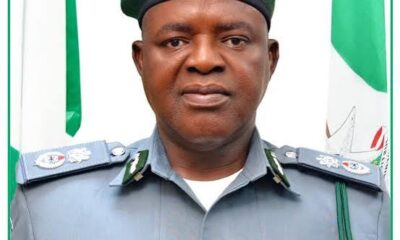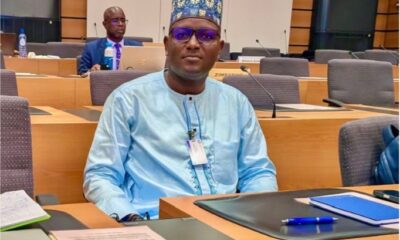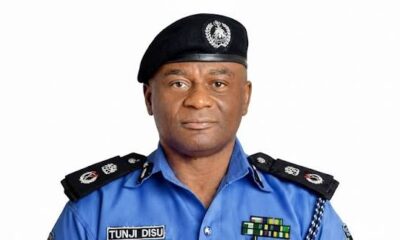Customs Report
‘Our Trade Security Is More Protected Under B’Odogwu’ – Daniyan

The Customs Area Controller (CAC), Nigeria Customs Service (NCS), Port Terminal Multi-Purpose Limited (PTML), Comptroller Tenny Mankini Daniyan has said that Nigeria’s trade data is more secured under the new Unified Customs Management System (UCMS) known as B’Odogwu.
Daniyan in an exclusive chat with our editor, Eguono Odjegba, explained that the new platform is also faster and better than NICIS platform in several respect; noting that B’Odogwu’s deployment nationwide is presently an easy task since all related teething problems have been identified and resolved at the pilot scheme undertaken by PTML port.
While urging importers and clearing agents to be enthusiastic about its usage, he disclosed that B’Odogwu facilitated the exponential growth of the command’s revenue to N250billion between October last year and May 2025; even as he spoke about other important issues relating to the command’s operation. Excerpt:
As controller of PTML modern port, can you outline the key features that make this port a model port of contemporary efficiency, plus how are you driving those elements.
Thank you, as you rightly noted PTML is a model port on its own, because, apart from the facilities, its operational modalities are unique and because of that anyone will tell you we have security here for goods. There’s no pilfering, no vandalizing, and when you do the right things you can take delivery of your cargo, there is no bottle neck in taking your consignments out, bearing that in mind and with the current concept of trade transaction which is trade facilitation. The customs on their own have bought into it to ensure that we are there and swing with international best practices. And thank God the WCO has made certain things simple for us like simplified processes, harmonization of processes and reduction in NTB, that’s non tariff barriers. Every area that we cover trade in which trade is slowed down, we cut it off. And on our own we have done what is called capacity building. Because one of the first aspect for you to really, really ensure that you have a seamless trade according to the idea of a model port to ensure that things work out well, is education. So from time to time we sensitize ourselves, ensure that officers are abreast with what is happening. They surely know exactly what to do at any time. And because of that we have zero delays here, it is our policy here that if an agent has rightly declared his goods, he can enjoy two hours clearance, roro…ro-on-roll-off.
Really, is 2hours cargo clearance time frame possible?
Yes, we have enjoyed it before, we are even talking about one hour, that when you have declared your goods with integrity, you don’t waste time, it means you’re a compliant trader. You enjoy all the things you need to enjoy, fast trade, efficient trade for you, bottlenecks are removed and you’re good to go. So bearing that in mind our officers know that one of the things that will aid them is education, which means act, act enough, see that your declaration go right…because of the education they have they know exactly if it’s correct or not. Not to talk of the various products that the CGC has brought into fore to ensure that trade is facilitated. Talk of AOE, talk of Advanced Ruling…you can talk of B’Odogwu itself that we are piloting here is a beautiful platform for financial transaction that is impacting revenues, which I would say is far better than former one. It’s beautiful again because it is developed by us. It’s beautiful again because when there are challenges we have men that can address any challenge in time. So real time you have your products, you have things done in B’Odogwu, collect your revenue, facilitate trade and issues are resolved. You don’t need to either escalate an issue outside Nigeria like the NICIS 11. We can call somebody in Abuja, call somebody in ICT, call somebody in the technical team…it is an implementation team, ‘please we have this challenge, where are the software developers?’ ‘Can we address this, please?’ So that’s the beauty of B’Odogwu and AI that’s inside Budogu itself that can aid classification of goods, proper classification, it even has an advantage over NICIS itself…which are not comparable to the AI components of B’Odogwu. And the other feature, very robust feature that are inside that definitely…we are going to unleash to the Nigerian public to assist them in efficient cargo clearance and ports trade.
Taking about B’Odogwu, you had the privilege of pioneering the pilot scheme. Now it’s been escalated to other ports, after PTML, the nation’s two biggest seaports have been charted to begin the implementation. From your vantage position what advice, technical and operational do you have for the optimal performance of B’Odogwu as it gets deployed at Apapa and Tin Can ports.

As I said earlier there is no system that is perfect, no perfection in anything man has created, only nature is perfect. So then we have other experiences and all the challenges…all the observations have actually been escalated before now and they are being addressed. So we are not expecting how it started to be what they are starting with. When we started it was an uncharted course, it was like a blind man moving just trying to see how do I sail to shore. But now I can confidently tell you that there is a template. We have given it, we have seen it and we are actually coasting home. When we sailed people thought we won’t be able to get to our destination, but I can tell you that we got to our destination. We’re able to realize billions and billions and billions of naira in revenue from B’Odogwu, as at today we have made over N250billion, which means it is working. That’s why I said the issue…you know as I said, when you deploy any technical product you’ll have teething issues, you will have issues of acceptance, issues of people getting used to it or even knowing what to do. That’s why I said we have done all those preliminaries so the advice we are going to give is very simple…that people that have never used B’Odogo before should be patient and key into it; it’s very, very important. At times you have not used a product but you condemn it, but when you start using it you now start seeing the beauty in it. Like when we started, some people never knew…you know change is very difficult for people. We have been using NICIS for over 20 years and we resolved to change to B’Odogwu so some people resisted it. And we challenged them, ‘you have not even started using it and you’re complaining, why not use it.’ When they came in and started using it, they were the ones clapping for us, singing our songs, praising us everywhere. So I’ll repeat again, the only advice I have is that where they are being launched because it’s a success here…the CGC knew, he said it’s a success, that is why he and his management have this boldness, this audacity to roll out 38 commands not only Apapa and Tin Can alone, it is a nationwide roll out, it is an audacity in itself because we recorded huge sources here. Yes, it may not be 100% perfect like anything new, but we can say it’s over 90%. So the reality now is that people are embracing it. So the advice is that where we are going next, we should be prepared to educate, to sensitize people to buy into it, to come into it. Not to be ashamed or afraid when they have issues, they should come, they should approach us and we’ll assist them. And I know we have a readymade implementation team in all these areas because as I said earlier, all the likely issues have been resolved, here. That is why it is a pilot command, it was a feasibility command to check what are the nuisances that will likely come up…and all these things have been resolved and most of the night operation issues have been resolved too. So as we progress, yes, issues will come up…but I say one thing, the ability to resolve it is there, the capacity to resolve any contending issue is there because it was developed by us. So you can see the beauty of it, so the advice is simple: key into it, be ready to study as a clearing agent because if you don’t come forward to study and know the little, little differences between B’Odogwu and NICIS 11, you may not be able to use it despite that it is user friendly. It is a web based platform, you can do your declaration in your house and do whatever you want to do just like the former one. Once you make your payment you come down here for your goods, and one thing you have going for this is that it is very fast because they have a solid net of backup, yes, better than NICIS. They never heard of downtime here, we don’t experience it. We are on fiber optics as well as radio, and I think we are even going satellite. So you find what we are seeing is a massive, massive legacy project of the CGC that is being put into the Nigerian Customer Service to outlast everything; because it’s far better than NICIS, to be honest with you. And it’s going to save the Nigerian government a huge amount of money. On NICIS we know how much it cost to sustain it. But now we are saying no, so we are saving cost by our processes and procedures driven by B’Odogwu, developed by Nigerians, Nigerian Customs Service being a partner to it with the TMP. So officers that weigh in from the advanced unit unlike you don’t even know where NICIS is coming from. So our trade details are secured, there’s security in the system which means it only belong here, there’s no third party having access to our trade security. The secret is Nigeria and with Nigerians. So it has so many beautiful things going for it.
Let us look at the prospect of 24hours bought operation. You even said the possibility of a 2hour cargo clearance is doable and been considered…
We are already doing 2hours… RORO, there is also a possibility we can make it one hour. If you are a compliant trader and make a declaration, 1 hour, 2 hours you’re out of the port. Our operations are largely roll-on-roll-off, vehicles, what are you examining? A clean vehicle comes out and you have paid…that is called pre- shipment inspection…pre arrival when you do your PAAR, it only means it has been done. That is it, it is called pre arrival assessment report…before the ship arrives you already have your bill of laden, you have done the needful, have gotten your PAAR, you have done your declaration, as it is coming in you strike and you go.
There was a recent stakeholders’ workshop where stakeholders discussed 24 hours port operation, I listened to those identified some of the challenges relating to rivalries and all of that. Now we have you as a credible voice in the system assuring that it is working here, different from the handful of those saying it’s more of talk than action. How do we actually translate this talk into action, in the overall interest of all?
Well like l said, the system is not going to be the problem. I said some people are averse to the system, to acceptability, you must make up your mind to accept that this is the only way out. You must understand…it’s not the system now, have you accepted it? Once you accept it, you do the needful by ensuring that what you want to know about it, you know it, you are educated about it, you have built capacity for yourself. And like we did here, we did a lot of capacity building, tutored agencies, we tutored terminal operators, we tutored even banks, we tutored everyone that is involved in the maritime industry. So we had lectures, we did sensitization and we educated them on so many things and if they are not clear about it, they are always welcome and we take them through. So it’s the same that’s going to happen in the other areas. People should accept it, people should embrace it. You should key into it, once you key into it definitely… you’ll get the best of it. Which means you are ready to learn because at times…whatever it is…remember that it is a new product and it has its own differences compared to what you were used to. So you must learn the new things that are embedded in B’Odogwu. So, nationally, I would say yes, the stakeholders must be ready, they should be ready to buy into it and use it…and their feedbacks will give more and better improvement to what we even have here. The capacity of trading in Tin-Can or the volume of trading in Apapa is bigger than here…people may have issues or challenges that we never experienced…it is a possibility. So definitely they will be addressed at that level. That’s why l said that as you use it, whatever issues that comes up will be handled because technically, with the system, we have resolved all the things that were problematic at the pilot level, above 95 percent.
Let’s look at the incidences of stolen cars from overseas trafficked through PTML and a rough yearly estimate; plus your advise on how this challenge can be dealt with.
Since l got here, I’m over one year here we have never gotten a stolen vehicle in PTML, so far. I told you from the start that this is a highly regulated and controlled terminal where the owners ensure that whatever they are bringing in fulfill all international best practice. There’s no stolen car that has been brought here as far as l know.
How is your revenue performance doing?
Oh, on revenue I told you I’ve collected a huge amount. We’re improving day by day because it’s a faster system. You declare, we get your revenue, we have no problem. I told you, we stopped using NICIS as late as October last year. So in the last six, seven months we have been on B’Odogwu…you can see what is on our board…as at today May 21, 2025, we have not changed what is there, that record you’re seeing there is for yesterday, it is over N20billion that we have collected. If you tally what we have from October last year till date we have over N250billion. So it’s not affecting our revenue negatively, rather it’s helping our revenue to achieve faster turnover …because downtime is not there. I know revenue collection depends also on the cargo throughput. The more, the higher, the lesser volume, the lesser revenue you get. It is getting better day by day, things are getting better. Yes, because as you said earlier, this is the major port for landing of vehicles before now they told us that…we are talking of about 18000 to 20,000 cars that are released on the average per month here, before the flotation of the naira which probably affected the capacity to be bringing in more vehicles. They have started bringing in all sorts of things, scraps although it has reduced.
And what of the high volume of trading in accidented vehicles, the one you just called scraps, what is encouraging its import?
I think it’s the cost factor in the originating countries, the cost is cheaper…they are mostly auctioned, you buy an accidented vehicle let’s say $10,000 and somebody is offering a new one for $25,000, many people will go for that and come to repair them in Nigeria. It’s not custom that encourages people, it’s your pockets that encourage you on what you buy. Do you understand? And normally accidental stuffs are cheaper. And again, because some of them bring certain accidented products here like vehicles they come to cannibalize it or are sold as spare part for the ones that are ready.































